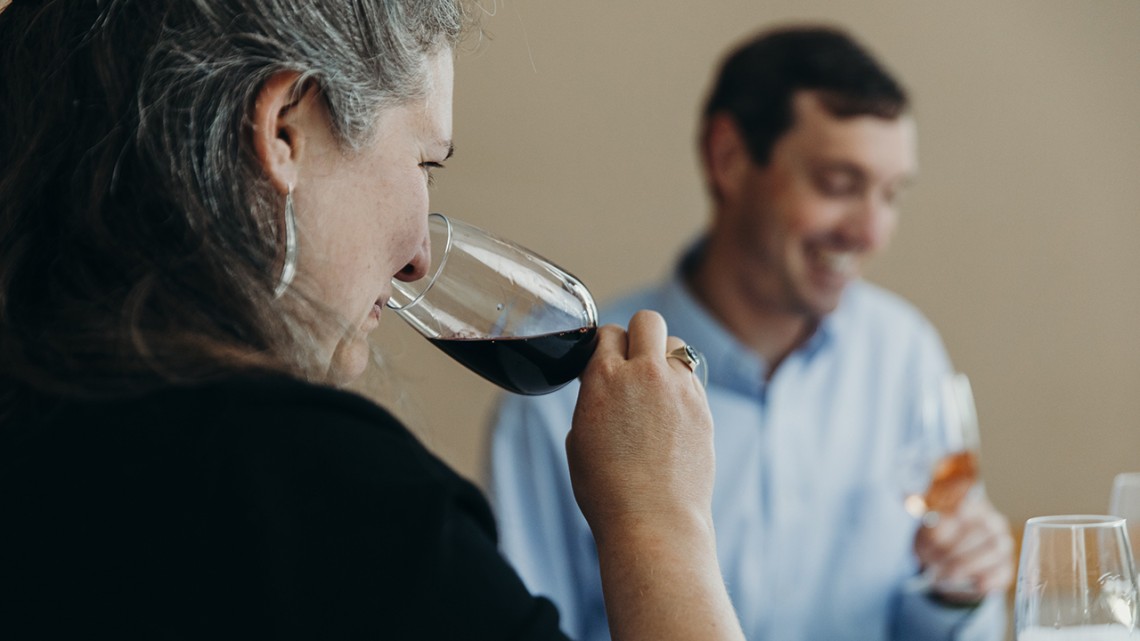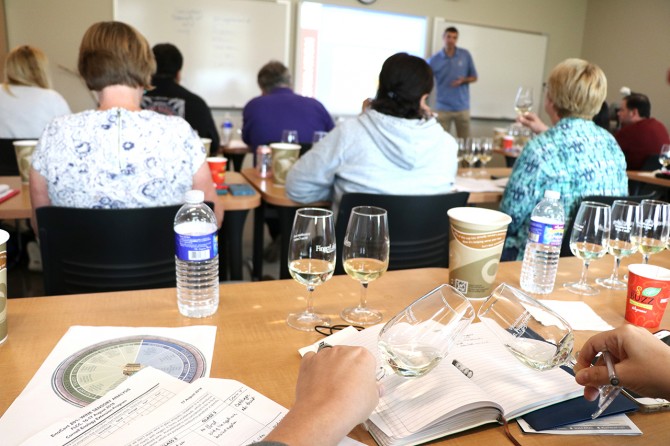
Associate professor Anna Katharine Mansfield, left, and enology extension associate Chris Gerling sample wine at Cornell AgriTech.
EnoCert program spurs winery operation expertise
By Erin Flynn
Producing quality wine is an art form combining the elements of sight, taste, smell and strategic decisions. EnoCert, a new certification program offered through the Cornell Enology Extension Lab at Cornell AgriTech, helps winery employees and aspiring wine professionals grasp the nuances of this art from vine to glass.
New York state has about 450 commercial wineries contributing approximately $2 billion to the state economy. “There are 4.5 million tourists visiting New York state wineries each year, and their interactions in winery tasting rooms are often their introduction to the industry,” said Anna Katharine Mansfield, associate professor of enology in the College of Agriculture and Life Sciences (CALS). “Our certificate programs ensure that all winery staff, from tasting room to management, understand the basics of wine growing, making and sensory evaluation, so they can better educate consumers.”
With instruction in a variety of viticulture, enology and wine business related topics, 27 participants from six states came to Geneva, New York, Aug. 13-17 as part of the EnoCert program. Cornell faculty in CALS, the School of Hotel Administration and Cornell Cooperative Extension taught a series of certification classes with an emphasis on expanding practical knowledge of vineyard and winery operations.
“Cornell courses like these help fill in some fundamental winemaking questions in a hands-on way,” said Jen Neubauer, an assistant winemaker at Keuka Lake Vineyards, who took part in the intro to viticulture and enology and the wine sensory analysis classes. “The connection of Cornell faculty to real issues being faced in commercial wine cellars is helping elevate wine quality in the Finger Lakes.”
A course on tasting room sales strategies attracted winery owners, tasting room employees and prospective winery entrepreneurs, as Kathryn LaTour, associate professor of services marketing and the Banfi Professor of Wine Education and Management in the Hotel School, explained consumer interests, motivations and educational needs. She emphasized ways to promote the wine industry as a whole as well as individual wine sales.
“There’s a lot of complex terminology in the wine business, and Cornell experts help break these terms down in a way that can be easily understood by the average wine consumer,” said Anna Martin, a tasting room employee from Palmer Vineyards on Long Island, who took part in the wine sensory analysis course.
Cornell viticulture and enology experts led a two-day interactive course explaining how vineyard site, climate and trellising systems affect grape production and quality. Led by Mansfield, CCE viticulture extension specialist Hans Walter-Peterson and enology extension associate Chris Gerling, the course expanded participants’ understanding of production steps for specific wine types and how key decisions can influence wine style.
An EnoCert course focused on potential winemaking flaws as well as optimal wine standards. Taught by Gerling and Mansfield, the sensory-focused course concentrated on how perception varies from person to person, and how each individual can use their specific strengths to evaluate wine quality and typicity, a term that refers to how much wine tastes like the grape variety from which it is made.
“This course ups the ante in wine quality by teaching professionals that making a good wine includes understanding mistakes that can happen and how to avoid them in the winemaking process,” said Adrienne Lindstrom, a graduate student in enology who is training to become a winemaker.
“There are wineries in all 50 states, and only a handful of enology extension programs, said Mansfield. “While our first priority is training New York producers, wine professionals from many regions can improve their winery operations through our programming.”
Said Carlos Santiago of Almathea Cellars in Atco, New Jersey: “One benefit of this program is that it offers relatable knowledge that not only applies to New York state, but to my cool climate wine-producing region as well.”
Erin Flynn is senior manager at Cornell AgriTech.
Media Contact
Get Cornell news delivered right to your inbox.
Subscribe

